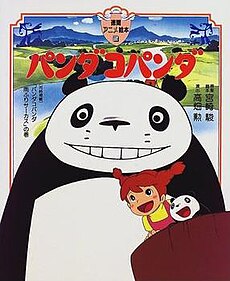Panda! Go Panda!
| Panda! Go, Panda! | |

Cover of Japanese DVD
|
|
|
パンダ・コパンダ (Panda Kopanda) |
|
|---|---|
| Genre |
Comedy Anime |
| Anime film | |
| Directed by | Isao Takahata |
| Produced by | Shunzo Kato |
| Written by | Hayao Miyazaki |
| Music by | Masahiko Satō |
| Studio |
Tokyo Movie A Productions |
| Licensed by | |
| Released | December 17, 1972 |
| Runtime | 33 minutes |
| Anime film | |
| The Rainy-Day Circus | |
| Directed by | Isao Takahata |
| Produced by | Shunzo Kato |
| Written by | Hayao Miyazaki |
| Music by | Masahiko Satō |
| Studio |
Tokyo Movie A Productions |
| Licensed by | |
| Released | March 17, 1973 |
| Runtime | 38 minutes |
Panda Kopanda (パンダ・コパンダ translated "Panda, Baby Panda") is a children's Japanese animated film, first released in 1972. It was created by the team of Isao Takahata (director), Hayao Miyazaki (writer, layout, scene design), Yoichi Kotabe (animation director) and Yasuo Otsuka (animation director, character design). This short movie was released in Japan at the height of the panda craze, initiated in September 1972, when the government announced the loan of a pair of giant pandas from China to the Ueno Zoo as part of panda diplomacy.
A success in Japanese theaters, its creators followed up with Panda Kopanda and the Rainy-Day Circus in 1973, which was also a success. In 1974, Takahata, Miyazaki and Kotabe would create the landmark anime series Heidi, Girl of the Alps. In 1985, Takahata and Miyazaki would found Studio Ghibli.
Panda Kopanda is known in North America by the title, "Panda! Go Panda!" The two short films are available on DVD and Blu-ray in Japan, and on DVD in North America.
The plot follows Mimiko (ミミ子), a bright little girl left alone when her grandmother leaves on a trip. Making a few stops at some local stores, Mimiko comes home to her house in a bamboo grove and finds a baby panda named Panny sleeping on the back doorstep. She quickly makes friends with the little panda, and invites him in for a drink. His father, PapaPanda, soon comes to visit, and they decide to become a family after PapaPanda offers to be Mimiko's father (Mimiko never had any parents). The three adjust to life together during their first night together, while Mimiko writes the first of many letters to her grandma (who she promised to write to every day).
...
Wikipedia
